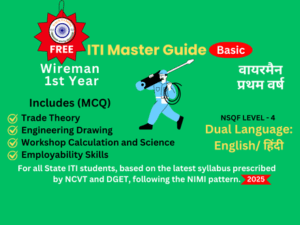Psychological Perspectives of Education - शिक्षा के मनोवैज्ञानिक परिप्रेक्ष्य
- Description
- Curriculum
- Reviews

Model Question Paper
Psychological Perspectives of Education – शिक्षा के मनोवैज्ञानिक परिप्रेक्ष्य
Key Features | मुख्य विशेषताएँ
- Bilingual Model Paper | द्विभाषी मॉडल पेपर
- Enough MCQ for Practice | अभ्यास के लिए पर्याप्त MCQ
- Exam Practice Paper with Mock Tests | मॉक टेस्ट के साथ परीक्षा अभ्यास पत्र
- Latest Syllabus as per NEP | NEP के अनुसार नवीनतम पाठ्यक्रम
- Designed by Experts | विशेषज्ञों द्वारा तैयार किया गया
The given MCQs cover only 10% of the syllabus | दिए गए बहुविकल्पीय प्रश्न केवल 10% पाठ्यक्रम को कवर करते हैं।
To cover 100% of the syllabus with summaries, upgrade to our Advanced Model Paper.| पूरा सिलेबस और सारांश कवर करने के लिए हमारा एडवांस मॉडल पेपर जॉइन करें। Join Advanced Model Paper
|
Program Class: Diploma/ BA |
Year: Second |
Semester: Fourth |
||
|
Subject: Education |
||||
|
Course Title: Psychological Perspectives of Education |
||||
|
Course Learning Outcomes: On completion of this course, learners will be able to: · Define Education and Psychology. · Relate Education and Psychology. · Compare characteristics and needs of different stages of development. · Name different approaches of learning. · Distinguish between different psychological traits. · Identify Individual Differences. · Examine the importance of Mental Health. · Illustrate Teaching Learning Process. |
||||
|
Credits: 4 |
Core Compulsory |
|||
|
Max. Marks: –25+75 |
Min. Passing Marks: 33 |
|||
|
Unit |
Topics |
|||
|
I |
EDUCATION AND PSYCHOLOGY
|
|||
|
II |
PROCESS OF DEVELOPMENT
|
|||
|
III |
UNDERSTANDING THE LEARNING
Learning Theories:
|
|||
|
IV |
FOUNDATIONS OF BEHAVIOURS AND THEIR ROLES
|
|||
|
V |
INDIVIDUAL DIFFERENCES
|
|||
|
VI |
SPECIAL NEED LEARNERS
|
|||
|
VII |
MENTAL HEALTH AND ADJUSTMENT
|
|||
|
VIII |
TEACHING AND LEARNING PROCESS
|
|||
-
1Unit 1: MCQs - Psychological Perspectives of Education - शिक्षा के मनोवैज्ञानिक परिप्रेक्ष्य
-
2Unit 2: MCQs - Psychological Perspectives of Education - शिक्षा के मनोवैज्ञानिक परिप्रेक्ष्य
-
3Unit 3: MCQs - Psychological Perspectives of Education - शिक्षा के मनोवैज्ञानिक परिप्रेक्ष्य
-
4Unit 4: MCQs - Psychological Perspectives of Education - शिक्षा के मनोवैज्ञानिक परिप्रेक्ष्य
-
5Unit 5: MCQs - Psychological Perspectives of Education - शिक्षा के मनोवैज्ञानिक परिप्रेक्ष्य
-
6Unit 6: MCQs - Psychological Perspectives of Education - शिक्षा के मनोवैज्ञानिक परिप्रेक्ष्य
-
7Unit 7: MCQs - Psychological Perspectives of Education - शिक्षा के मनोवैज्ञानिक परिप्रेक्ष्य
-
8Unit 8: MCQs - Psychological Perspectives of Education - शिक्षा के मनोवैज्ञानिक परिप्रेक्ष्य







